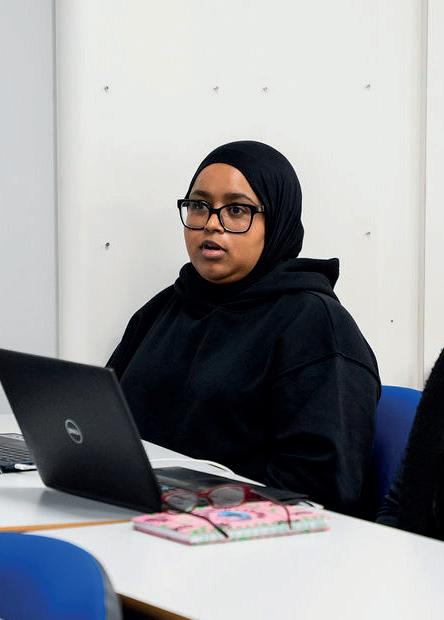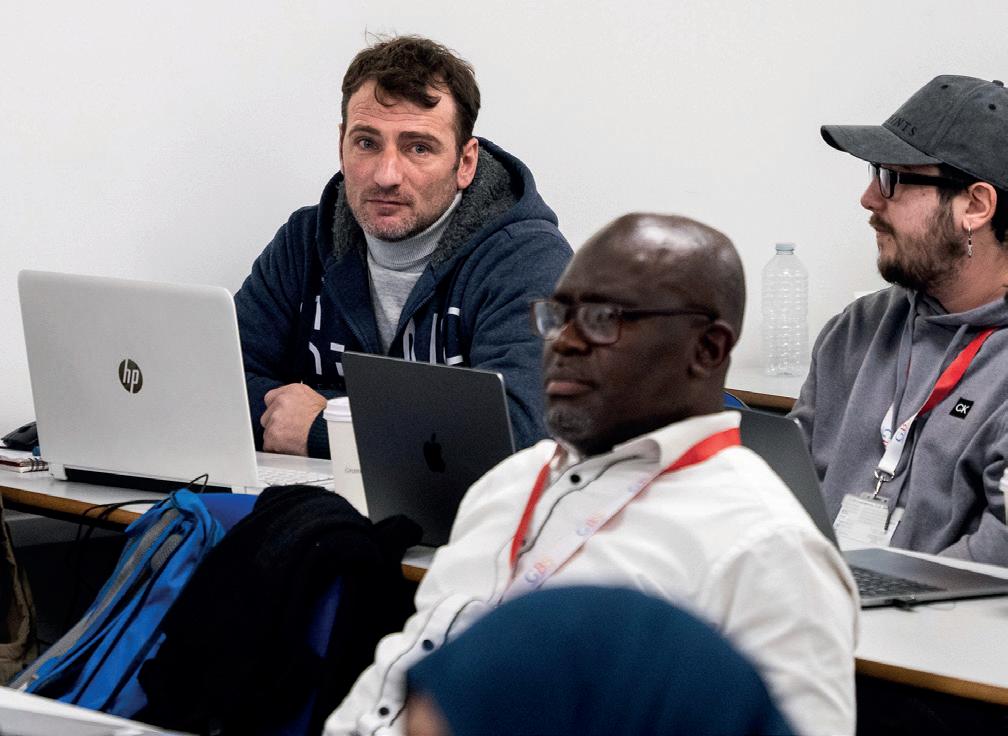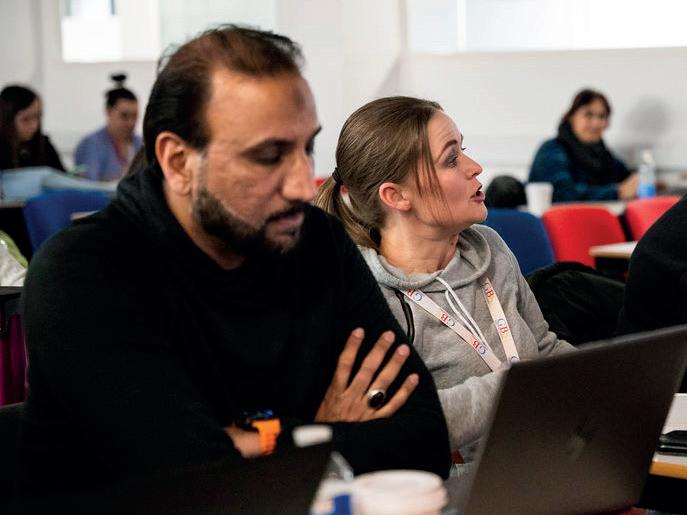

LEARNING FOR LIFE: UNLOCKING THE POWER
OF
ADULT LEARNERS TO REBUILD BRITAIN’S WORKFORCE


0. Foreword
GBS has more than 35,000 students across London, Birmingham, Manchester, and Leeds. We work in partnership with leading UK universities to deliver the highest quality programmes across business and management, banking and finance, health and social care, digital technologies and construction management.
As a result of our flexible learning model, where students can study during the week, on weekends and into the evening, we widen access to groups who are left behind by more traditional methods of higher education.
As a result of this, our average student age is 37, many of whom already have jobs, a family or who want to take the next step in their career.
What we’ve seen in the 15 years since we started operating, is the critical role lifelong learning plays in addressing skills shortages across a range of key sectors.
Right now, the government’s focus is on broader economic growth, and more specifically building a skilled workforce for the NHS, and addressing the demand across the construction sector for a range of builds taking place across the UK.
These sectors simply won’t have the skills demand met without the work of institutions like GBS. We deliver graduates who are jobready from day one, and also bring a wealth of lived experience that other younger graduates from traditional providers of higher education ultimately lack.
It really is quite simple. Adult learners need to be a key focus of policy when it comes to building a sustainable education sector, that will continue to support and ultimately rebuild Britain’s workforce in the long term.
James Kennedy, CEO of GBS
1.
Executive Summary
Britain’s economic and public service ambitions rest on a workforce that is increasingly older, more diverse, and already in work.
If the country is to meet its goals on housing, health, net zero and opportunity, it must urgently build an education system that supports adults to retrain, upskill and return to learning across their lives.
Adult learners are not a marginal group; they are central to the national skills strategy. But too often, policy design assumes a young, full-time learner. The reality for millions is more complex: interrupted learning journeys, part-time work, caring responsibilities, and a desire for second careers.
Meeting this challenge means rethinking how the country supports people to reskill, retrain and requalify, not just once, but throughout their lives. It means designing education systems not only for young people starting out, but also for adults looking for a way back in.
This Paper makes the case that adult learners, particularly those without existing higher qualifications, must be central to the UK’s skills strategy. They are not a side issue; they are the majority of the workforce. Yet too often, the system treats them as an afterthought: too inflexible, too narrow, too late.
It does not have to be this way. With the right routes in, and the right structures of support, adults can and do succeed in education and go on to fill critical roles in the sectors where Britain needs them most. A revitalised Adult Learning Strategy would unlock new talent pipelines, reduce long-term unemployment, raise productivity, and drive local economic renewal.
This Paper calls for two bold but achievable reforms to unlock that potential:
Recognise and regulate foundation years as a trusted, mainstream route into higher education for mature learners, particularly those seeking to enter priority professions like healthcare, construction and public service. Foundation years are already working for thousands of adults, but their role remains under-valued and inconsistent across the sector.
Implement the Lifelong Learning Entitlement (LLE) in a way that meets the real needs of adults: making provision flexible, and careerrelevant. The LLE has the potential to transform access, but only if learners can use it at the moments, and in the formats, that suit their lives.
What’s missing is not the case for action. It’s the coordination and commitment to act. This Paper sets out how to do so, clearly, affordably, and at pace.
This Paper is grounded in the real-world example of Global Banking School (GBS), which operates a model that demonstrates it is possible to build an inclusive, outcomes-focused education system that meets adult learners where they are - and in doing so, helps meet the UK’s urgent skills needs.
GBS is a part of the Global Education Group (GEDU) family. GEDU is an international education organisation that owns and operates a number of higher education institutions, like GBS, with a mission to widen access to education.

2. Why Adult Learning Must Be a National Priority
For Britain to thrive, it needs a workforce that is not only larger but more skilled, resilient and responsive to change.
Right now, in too many parts of the economy, the gap between demand and supply is growing, and existing training systems are not keeping pace. The consequences are already visible: delayed infrastructure, cancelled surgeries, unstaffed classrooms, and stalled progress towards net zero.
But these are not just workforce problems, they are capacity problems that cut across public service delivery, housing, and regional economic development. Without decisive investment in the skills system, they risk becoming permanent constraints on growth.
2.1 Urgent Gaps in the Workforce
Across key sectors, the UK is facing severe and widening skills shortages:
Construction will require an additional 239,000 workers by 2029 to meet housing and infrastructure targets. This includes not just labourers, but also site managers, project planners and building retrofit specialists. Yet employers report chronic difficulty filling vacancies, averaging 38,000 per month, with a third of firms saying skills shortages are limiting their ability to grow.
Health and social care are already under extreme pressure. The NHS has over 133,000 vacancies, including 47,000 nursing posts. Projections suggest the system will need up to 488,000 more staff by 2030. Social care faces similarly acute challenges: turnover is high, vacancies are rising, and workforce capacity isn’t keeping up with demand from an ageing population.
Upskilling adults must become part of the national workforce strategy.
Education is in the grip of a teacher supply crisis. In 2023/24, the government fell short of its secondary teacher recruitment target by nearly 40%. Vacancies are at their highest recorded level, especially in science, maths, and computing. Many schools in disadvantaged areas struggle to recruit qualified teachers at all, weakening the very foundations of future opportunity.
Green industries, too, face a skills crunch. Reaching the UK’s net zero targets by 2050 will require around 1.2 million new jobs, with 694,000 of those needed by 2030 alone. These include roles in renewable energy, energy efficiency, and environmental restoration. But right now, fewer than 4% of advertised jobs are in green sectors, and employers regularly cite lack of skills as a barrier to growth.
These are not niche sectors. They are the scaffolding of a thriving society and economy. And the reality is that these roles cannot all be filled by school leavers or young graduates. Many of the workers needed already exist in other jobs, in other sectors, or out of the labour market entirely.
Upskilling adults must become part of the national workforce strategy. Without them, the UK simply will not have the people to build homes, care for patients, teach children or decarbonise the economy.

2.2 A System That Doesn’t Fit Adult Learners
Despite the scale of the challenge, adult learners remain on the fringes of mainstream education policy. Too often, systems are designed around those progressing directly from school and college, ignoring the needs of those who have taken a different path, or who are trying to re-enter education later in life.
The numbers tell the story:
Fewer than 1 in 10 full-time undergraduates in the UK are over the age of 30.
Part-time and adult enrolments have fallen dramatically since 2012, particularly after changes to tuition fee rules and financial support.
Only a third of adults participate in any kind of formal learning after leaving school.
That leaves millions of adults without the qualifications, confidence or opportunity to retrain, even as demand for their labour grows. Many want to progress but are blocked by practical barriers: cost, time, childcare, or uncertainty about their options. Others simply don’t see education as “for them” anymore.
The result is a system that is efficient for the few, but exclusionary for the many. It shuts out people with potential: people with work experience, life knowledge, and a desire to improve their lives, but without recent qualifications or academic pathways.
If Britain is serious about growth, opportunity and productivity, it must build a system that fits adult learners, not expect them to fit the system.
3. The Case for Foundation Years
For many adults, the greatest barrier to re-entering education is not motivation, but qualification.
Traditional routes into higher education often assume a linear path through GCSEs, A-levels and university. But for the majority of working-age adults, life hasn’t followed that script.
Foundation years, often known as “Year 0” of a degree, provide a vital second chance. They offer learners the opportunity to build up academic confidence, gain essential study skills, and prepare for a full degree programme.
Not only are foundation years about catching up: they are about bridging ambition and opportunity for those whose pathways have been paused or disrupted. In a world of career change and lifelong reskilling, these routes are more important than ever.
These programmes are increasingly used by mature learners, career changers and those from disadvantaged backgrounds. National data shows:
64% of foundation year students are aged 21 or over, compared to just 19% of those entering year one of a traditional degree.
Nearly 60% enter without standard Level 3 qualifications, the very group most excluded from formal education routes.
46% come from ethnic minority backgrounds, and 76% from the most deprived communities in England.
Foundation years are not only effective at widening access; they are also key to filling skills gaps in the economy. Many participants progress into high-demand professions like
healthcare, business, and construction. For those who succeed, the foundation year is transformative, not only personally, but economically.
Yet despite their growth and impact, foundation years remain under-recognised in national policy. There is no consistent framework for delivery, quality assurance, or alignment with employer needs. Provision is patchy, standards vary, and their potential in workforce planning is often overlooked.
To change that, this Paper calls for a clear national framework that does three things:
sets robust quality standards for foundation year delivery, ensuring all learners receive structured academic preparation and tailored support;
recognises foundation years as a core progression route into high-demand sectors: particularly those with longstanding workforce shortages, like health and construction;
encourages active collaboration between universities, FE colleges, and employers to co-design foundation year content that is locally relevant, career-focused, and flexible.
At GBS, foundation years are central to its mission. They allow learners who may not have studied formally for decades to restart their education journey with support, structure and purpose. Many go on to complete degrees in applied fields like healthcare management or construction leadership, qualifications that feed directly into regional skills plans and local employment pipelines.
For the education system to deliver on its opportunity promise, and meet the needs of the economy, it must treat foundation years not as an exception, but as a standard, supported route into higher education and skilled employment.
4. Making the Lifelong Learning Entitlement
Work for Adults
The Lifelong Learning Entitlement (LLE), launching in 2025, is one of the most significant education reforms in a generation. For the first time, adults in England will be able to access a flexible loan, equivalent to four years of post-18 study (around £37,000), to fund higher and further education across their working life. In principle, this opens the door to upskilling, retraining and career progression at any stage.
But turning principle into practice depends on how well the system works for those who need it most. That means putting the needs of adult learners, not just institutions, at the heart of the LLE’s design.
4.1. A System That Fits Around Life
Most adult learners are not studying fulltime. They are working, raising families, caring for others, or managing complex lives. Traditional models of three-year degrees with rigid term dates are simply out of reach.
For the LLE to succeed, flexibility must be a core feature, not an afterthought.
That means:
Structured programmes that allow learners to step in and out over time, enabling pauses for maternity, health or life events, are essential. While modularity may work well for technical or CPD-style learning, most adults benefit more from predictable, coherent programmes with the flexibility to return where they left off.
Flexible scheduling, including evenings, weekends, online and hybrid delivery, to fit study around work and family commitments.
A credit system that enables re-entry into structured programmes without restarting is important, but wholesale portability between institutions is challenging, especially in regulated fields like health and construction. Government must avoid prescriptive curriculum in favour of transparent progression routes within institutions or partnerships
Accessible guidance and wraparound support, especially for those who have been out of education for years or lack confidence navigating the system.
Without these features, the LLE risks reinforcing the very barriers it was designed to break down.
4.2. Removing the Real Barriers
Research consistently shows that adults are keen to learn but are held back by time, money, and confidence. In many cases, learners are not even aware of the options available to them or assume it’s “too late” to start again.
To make the LLE work, the system must also respond to the rise of mid-life career shifts, whether due to redundancy, burnout or changing priorities. This is no longer exceptional: people in their 30s, 40s and 50s are seeking purposeful second careers in teaching, healthcare or green industries. Structured and supported re-entry routes will be vital. Government and providers must take proactive steps to:
Demystify the system: with clear, jargon-free information on what’s available and how to access it.

Target outreach at key moments: redundancy, return from parental leave, or health recovery can all be natural prompts to re-enter learning, if the system is ready to meet them.
Address the challenge of placements: which can deter mature learners, especially those with jobs or caring responsibilities. This could mean flexible placement windows, localised options, or simulated practice where appropriate.
GBS’s experience shows that when these conditions are in place, adults respond. With evening and weekend courses, flexible start dates, and dedicated support services, thousands of learners aged 30+ are enrolling each year—many of whom had previously assumed higher education was closed off to them.
4.3.
A Catalyst for Growth, If Done Right
The LLE has the potential to unlock vast pools of untapped talent. It can help fill skills shortages, support economic mobility, and give individuals control over their working futures. But its success will depend not just on the availability of funding, but on how intuitively, fairly and confidently it can be used.
Done well, it could reshape the relationship between work and learning. Done poorly, it risks becoming a complex system that few feel able to access.
The opportunity is there. The blueprint, through places like GBS, already exists. The task now is to deliver an LLE that truly meets adults where they are and supports them to get where they want to go.
5. GBS in Practice: Meeting Learners
Where They Are
The policy case for expanding adult learning is clear, but GBS demonstrates what it looks like in practice. As one of the UK’s fastest-growing higher education providers, GBS is already delivering the kind of open and flexible model that national reform aims to scale.
5.2. A Delivery Model That Works Around People’s Lives
What sets GBS apart is not just who it recruits, but how it delivers:
Foundation years are widely available, opening the door for those without A-levels or formal qualifications.
Evening and weekend classes allow learners to balance study with work, childcare or caring responsibilities.
Health and social care, from frontline practice to management and service design.
Business, finance and digital skills, particularly those needed by SMEs and public service organisations.
Through aligning courses to workforce priorities, GBS ensures that learners aren’t just earning degrees: they’re gaining qualifications that translate into real economic value, both personally and nationally.
5.4. A Recognised Standard of
Quality
With over 30,000 students enrolled across campuses in London, Birmingham, Manchester and Leeds, GBS has built a system designed from the ground up around the realities of adult learners, not simply adapted from traditional models.
5.1. A Learner Profile That Reflects the Real Economy
GBS students are older, more diverse, and more likely to come from areas traditionally excluded from higher education:
The average student is 37 years old.

97% are aged 21 or over; two-thirds are aged over 31.
Over three-quarters come from the most deprived communities in England.
95% are UK-domiciled, with many returning to education after long periods in the workforce or out of study entirely.
These learners are not anomalies, they are exactly the kind of students the Lifelong Learning Entitlement is designed to support: local, working-age adults seeking a second chance to build skills and progress.

Campuses are placed in deprived areas, reducing travel and increasing local visibility.
Wraparound support includes study skills, employability coaching, wellbeing resources and tailored pastoral care, recognising the pressures that come with returning to study later in life. This support also includes flexibility for those pausing study due to family, work or health events: ensuring students can resume their studies without penalty.
The design is intentional. Everything about the GBS offer, from curriculum structure to timetabling and support, is geared towards removing friction for those who might otherwise be locked out of higher education.
5.3. A Curriculum Aligned to National Skills Needs
GBS focuses on career-aligned courses that map directly to sectors with high employer demand:
Construction management, including site leadership and retrofit project delivery.
In 2023, GBS was awarded a Silver rating in the Teaching Excellence Framework (TEF) for student experience, with outcomes for underrepresented learners rated as high quality.
The TEF panel highlighted GBS’s support for mature and disadvantaged students, as well as its contribution to driving academic standards in widening participation.
That recognition is significant. It shows that education for all can also be high-performing, and that widening access need not mean compromising on ambition.
GBS proves what is possible when education is designed around the learner, not the system. Its approach offers a route for how Britain can rapidly scale adult education, reaching those most in need and contributing directly to national skills goals.
In a policy landscape focused on economic resilience, public service reform, and opportunity for all, GBS is already showing what success can look like: today, not tomorrow.

6. Policy Ideas
Delivering a skills system that truly works for adult learners will require structural reform and cultural shift.
But the building blocks already exist, and many of the necessary changes are within reach. The following ideas offer a practical agenda for government, education providers, and regional leaders to unlock adult potential and meet the country’s workforce needs.
1. Make Foundation Years a Recognised National Pathway
Introduce a clear national framework to regulate and support foundation years, with consistent quality standards and a defined role in widening access.
Promote foundation years as a mainstream route into higher education, particularly for adult learners entering shortage sectors like construction, health and social care, and public services.
Incentivise collaboration between higher education institutions, FE colleges and employers to design sector-specific foundation provision aligned to local skills needs.
2. Ensure the Lifelong Learning Entitlement Works for All
Design the LLE to support structured learning with built-in flexibility: so that adults can pause and return without disruption. While modular options should be available for specific technical or CPD needs, most learners benefit from a coherent pathway over time.
Require providers to offer flexible delivery models, evening, weekend, part-time and online, that fit around adult responsibilities.
Fund learner guidance and credit transfer infrastructure to help adults navigate options and avoid duplication of learning.
3. Put Adult Learning at the Centre of Regional Skills Planning
Set explicit targets for adult retraining in Local Skills Improvement Plans (LSIPs), tied to priority sectors and regional growth opportunities.
Channel investment through the Local Skills Improvement Fund (LSIF) to support local partnerships that can deliver high-quality adult learning, including through community-based campuses and outreach.
4. Reward Inclusive and OutcomeFocused Provision
Provide funding and regulatory incentives for providers who develop career-relevant, parttime and flexible pathways for adult learners.
Shift quality assurance metrics to focus on learner progression and employment outcomes, not just academic continuation.
Support alternative placement models for mature students, like part-time, block-based, or locally delivered options that reduce time and cost burdens.

5. Support and Scale Proven Models
Use successful providers like GBS as case studies to demonstrate what representative, high-impact adult education can look like in practice.
Recognise and support provision targeted at career changers in mid-life, particularly in shortage sectors like health, teaching and green construction.
Create a policy environment that encourages innovation and scales models that work, particularly in under-served regions and sectors with labour shortages.
Create a policy environment that encourages innovation and scales models that work
Taken together, these actions would help deliver a system that is more open, more responsive, and more aligned to the lives and ambitions of working-age adults. It would also ensure that major public investments in skills and growth translate into real impact across the economy.


7. Closing
The future of the UK economy depends not just on technology, infrastructure or investment, but on people.
And in particular, on people who are already in the workforce, already raising families, already contributing, but who need a route back into learning and progression.
Adult learners are not the exception; they are the majority. They are care workers who want to train as nurses, builders ready to step into site management, parents returning to the workforce, or mid-career professionals looking to adapt to new industries. They are the untapped engine of Britain’s skills-led recovery.
But to unlock that potential, the education system must meet them halfway. That means:
Recognising foundation years as second-chance gateways into higher education.
Delivering the Lifelong Learning Entitlement in a way that fits real lives.
Creating pathways that are local, flexible, and career-aligned.
And backing the providers already doing this work with the funding, flexibility and recognition to grow.
GBS proves that this is possible, at pace and at scale. With the right support, adults from every background can succeed in higher education and contribute directly to solving the UK’s most pressing workforce challenges.
The case has been made. The policies are designed. What’s needed now is commitment, from policymakers, funders, and institutions, to put adult learners at the centre of Britain’s future.


